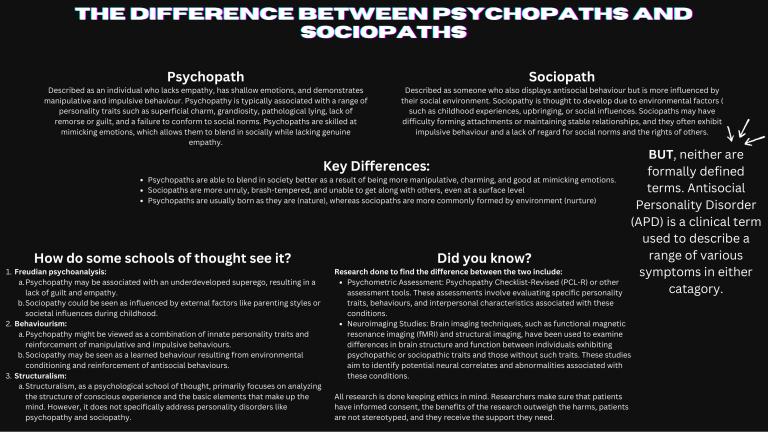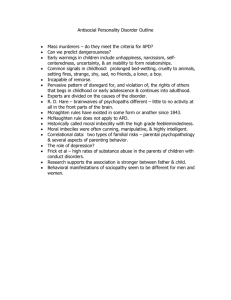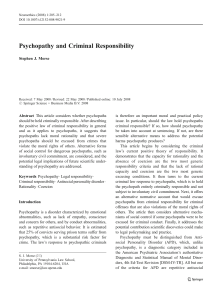
THE DIFFERENCE BETWEEN PSYCHOPATHS AND SOCIOPATHS Psychopath Described as an individual who lacks empathy, has shallow emotions, and demonstrates manipulative and impulsive behaviour. Psychopathy is typically associated with a range of personality traits such as superficial charm, grandiosity, pathological lying, lack of remorse or guilt, and a failure to conform to social norms. Psychopaths are skilled at mimicking emotions, which allows them to blend in socially while lacking genuine empathy. Sociopath Described as someone who also displays antisocial behaviour but is more influenced by their social environment. Sociopathy is thought to develop due to environmental factors ( such as childhood experiences, upbringing, or social influences. Sociopaths may have difficulty forming attachments or maintaining stable relationships, and they often exhibit impulsive behaviour and a lack of regard for social norms and the rights of others. Key Differences: Psychopaths are able to blend in society better as a result of being more manipulative, charming, and good at mimicking emotions. Sociopaths are more unruly, brash-tempered, and unable to get along with others, even at a surface level Psychopaths are usually born as they are (nature), whereas sociopaths are more commonly formed by environment (nurture) How do some schools of thought see it? 1. Freudian psychoanalysis: a. Psychopathy may be associated with an underdeveloped superego, resulting in a lack of guilt and empathy. b. Sociopathy could be seen as influenced by external factors like parenting styles or societal influences during childhood. 2. Behaviourism: a. Psychopathy might be viewed as a combination of innate personality traits and reinforcement of manipulative and impulsive behaviours. b. Sociopathy may be seen as a learned behaviour resulting from environmental conditioning and reinforcement of antisocial behaviours. 3. Structuralism: a. Structuralism, as a psychological school of thought, primarily focuses on analyzing the structure of conscious experience and the basic elements that make up the mind. However, it does not specifically address personality disorders like psychopathy and sociopathy. Did you know? BUT, neither are formally defined terms. Antisocial Personality Disorder (APD) is a clinical term used to describe a range of various symptoms in either catagory. Research done to find the difference between the two include: Psychometric Assessment: Psychopathy Checklist-Revised (PCL-R) or other assessment tools. These assessments involve evaluating specific personality traits, behaviours, and interpersonal characteristics associated with these conditions. Neuroimaging Studies: Brain imaging techniques, such as functional magnetic resonance imaging (fMRI) and structural imaging, have been used to examine differences in brain structure and function between individuals exhibiting psychopathic or sociopathic traits and those without such traits. These studies aim to identify potential neural correlates and abnormalities associated with these conditions. All research is done keeping ethics in mind. Researchers make sure that patients have informed consent, the benefits of the research outweigh the harms, patients are not stereotyped, and they receive the support they need. Works Cited Forbes Magazine. (2023, April 26). Sociopath vs. psychopath: What’s the difference? Forbes. https://www.forbes.com/health/mind/sociopath-vs-psychopath/ Johanson, M., Vaurio, O., Tiihonen, J., & Lähteenvuo, M. (2019, December 30). A systematic literature review of neuroimaging of Psychopathic traits. Frontiers. https://www.frontiersin.org/articles/10.3389/fpsyt.2019.01027/full Purse, M. (2022, November 14). How sociopaths are different from psychopaths. Verywell Mind. https://www.verywellmind.com/what-is-a-sociopath-380184 Ruhl, C., & AnalystB.A., C. R. A. (2023, May 9). How sociopaths are different from psychopaths. Simply Psychology. https://www.simplypsychology.org/psychopathy-vs-sociopathy.html











